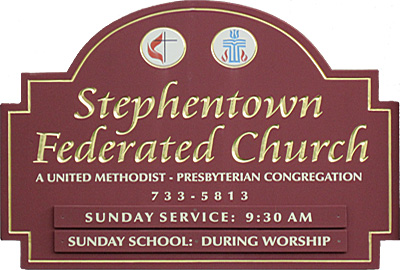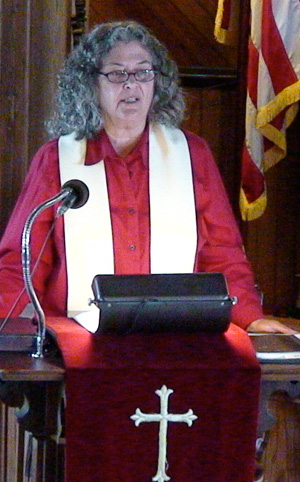Pastor's Sermons
Sermon for Oct. 2nd, 2011:
World Communion Sunday (based on Mt. 21:33-46)
As we have mentioned in the past, it is important to remember that Matthew’s Gospel is arranged to build suspense and drama as Jesus approaches the end of his ministry. In this passage he has just arrived in Jerusalem to the acclamation of the crowds, and is still talking to the chief priests and Pharisees, who have challenged his authority. He tells another parable, of tenants who refuse to turn over the harvest to the representatives of the landlord, killing them and hoping to keep the entire estate for themselves.
Indeed, it was not a bright plan; what made them think that they would get the vineyard and all its harvest for nothing? That being said, what about a landlord who would keep sending messengers to a crowd who had killed all the others? Who would send his own son into that crowd?
First of all, I believe that the tenants represented the people of Israel, who, having received the blessings of God, wanted to keep it for themselves. They excluded everyone else and killed the prophets who came to them… including the Son of God. Jesus’ response was to remind the leaders of the people that the “harvest” was not to be hoarded; it was not just for the people of Israel; it was/is for all. And the Landlord, crazily loving the people, kept sending workers, prophets and leaders to bring them back into relationship.
On World Communion Sunday this is a good reminder to all of us. We celebrate our oneness in the Christian community, and are challenged once again to expand our vision of the Realm of God. We are blessed beyond measure with our faith and with the bountiful lives we have. Do we hoard it? Do we feel entitled to keep it all and exclude others? Do we think that only Christians are heirs to the love of God? What is our responsibility regarding this harvest?
I was blessed this week to receive a link from my son Matt. It was the Convocation Address given to new seminarians at Princeton Theological Seminary by Kenda Creasy Dean. She tells the story of Adina Tumalu, a new seminary student in Southern Sudan. In that part of the world, Rev. Dean says, new seminarians will not study ethics, church polity or even Scripture this semester. The first semester of seminary for Adina Tumalu will mean studying Biblical Hebrew, Biblical Greek, Agriculture and Public Health.
In that part of the world it is recognized that ministry is not about saving churches. It is about saving lives. It is not about hoarding the harvest. It is about sharing life-saving, life-giving bread – figuratively and literally – with all. It means investing one’s whole self in bringing life. Otherwise, people will die.
Today, I believe that this broader perspective challenges us to even re-examine the very word “communion.” Yes… in the Christian community today we will share the bread and cup in our ritual, sacramental Communion. However: will we hoard that gift? That harvest? Are we tempted to hoard God’s crazy, illogical love for ourselves? Who else needs this life giving bread?
Our world today is diverse. It is also hungry for compassion, for peace and for openness of spirit. I believe that today, as WORLD communion Sunday, we are challenged to include all of God’s children in our mission of unity. Christians, Jews, Muslims, Hindus, Buddhists, Pagans, Agnostics, Atheists…. Does God not continue to send servants (that would be us) to all people? Rich and poor; strong and weak, lazy and ambitious, believers and non-believers; those who love us and those who hate us… like it or not, we are all in communion as citizens of this planet and tenants in the Realm of God. God provides the harvest of grapes and grain. God provides the bread.
We are called, not to flog the prophets who challenge us, nor limit the gift, but to share the life-giving bread of God’s love with the world. To invest every bit of our labor, sweat, hope and crazy, illogical love for that mission. To tend the vineyard - not for ourselves, but for God.
Otherwise, people will die.
The harvest did not belong to the tenants.
The harvest is not ours.
It is God’s.


